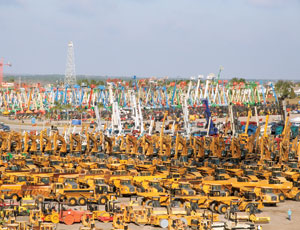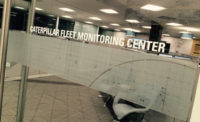From the vantage point of a helicopter hovering 1,000 ft above an ocean of heavy equipment, the Ritchie Bros. yard in Davenport, Fla., looks like a giant sandbox flooded with construction toys. In between the neatly arranged rows of excavators, loaders, dump trucks and cranes are colorful dots—men, women and children—weaving in and out of aisles in search of a bargain. In the center of the action is a white building where buyers are sitting comfortably in jeans
and flannel shirts inside an open-air auction theater. As small backhoes drive up on the main ramp, an auctioneer in an orange baseball cap belts out a tongue-twisting singsong: “A 13, 14, bidda-bidda 14 thousand….” The machines begin creeping off the ramp, and the tension grows. Buyers flash their hands, and prices fly by on a digital board. “Sold for 17!”
Above the ruckus, in a glass-encased VIP lounge overlooking the crowd, sellers are watching the prices like hawks. One large contractor’s fleet manager is here to help value his company’s assets; he was not interested in bidding. “We’re in the business of making used equipment,” he said curtly, then returned to watch the bidding arena through the glass window.
Small contractors grab up big bargains at auctions like the Ritchie Bros. Auctioneers Inc. sale near Orlando on Feb. 16-21, one of the largest industrial auctions in the world. Small firms exist in large numbers, and their impact on the market is huge. Peter Blake, CEO of Ritchie Bros., discussed the client makeup in an office near the VIP room on the first day of the company’s Orlando auction. “The people who are sitting in the audience right now, that’s the economy. They are the ones who are fixing the roads and bridges and putting up buildings,” he says.
In this buyer’s market, the quick clip of the auctioneer’s chant is barely fast enough to keep up with the liquidations. This year’s flood of goods has become too large for normal sales events. For the big February sale, Ritchie Bros. added 75 acres and a sixth day to accommodate the surge. Other nearby auctions have expanded in similar ways.
Thanks in part to the Internet, equipment auctions are global events. Brokers from Latin America and other corners of the globe were scouring the Orlando lot for machines worthy of export, while thousands of bidders watched prices on the computer screens. Cost of transport is a major factor in making an overseas deal. One international broker, who had hopped on a courtesy golf cart to inspect machines on the other side of the yard, complained that prices were not yet hitting the sweet spot. “A lot of people think that because of the economy, equipment will be cheap in the U.S.,” he said. “Unfortunately, it is not the case.”
Not all brokers agreed with that assessment. Prices are relative, they said. Freddy Barcena, a broker in Miami who was shopping for earthmoving machines for clients in Colombia, said he was pleased with the prices and condition of equipment up for sale in Florida so far this year. “The prices are really dropping compared to last year,” he explained. “Cash rules now.”

RICHMOND, BRITISH COLUMBIA
Florida’s link to ports makes this region a popular auction venue. Of course, Orlando also is a tourist attraction. While spouses and children head to theme parks, eager buyers visit a trifecta of free trade within a 40-mile radius. Every February, Alex Lyon & Son, Yoder & Frey and Ritchie Bros. boast huge sales in the Kissimmee area.
These sales have a profound impact on the industry. Slowdowns in construction last year prompted machinery dealers to hold onto their used iron and list it in the February sales, where they had a better chance of getting higher prices. “People are not able to find a way to sell these things at retail, so they are coming to auction,” said Bret Creech, international sales manager for Ring Power Corp., a Florida-based Caterpillar dealer that listed about $20 million of machinery at the Ritchie Bros. sale. Typically the annual auction’s lead consignor, Ring Power used the event to liquidate trade-ins, rental equipment and even some new machines. The sale was “a microcosm of what’s happening globally,” added Lou Amargo, a Ring Power territory manager.
A large portion of the equipment for sale leaves the state and eventually the country. “What we bring to the table is a true world market,” explained Gary Seybold, auction manager for the Ritchie Bros. Orlando sale. By the time the sale was over, 83% of the lots left Florida and 34% left the U.S., officials say.
Price Stability?
Auction companies are expanding at a time some economists are calling the biggest financial mess since the Great Depression. Last year, Ritchie collected 10% of $3.57 billion in gross auction proceeds, which rose 12% over 2007. It expects to keep growing. This year, Ritchie Bros. plans to add about 70 jobs and is expanding into e-commerce with a reverse- auction vendor, uShip Inc., Austin, Texas, to help buyers hook up with shipping companies, says Blake. Most sales now are offered on the Internet, allowing even more buyers from faraway places to sit at the bidding table.
Other auction firms also are active. IronPlanet grossed $337 million last year, a 43% increase. It inspects all of its machines and sells them online, which means sellers do not have to move the equipment to offload it. Even Peoria, Ill.-based Caterpillar Inc. is starting to move into the auction business.
Ritchie Bros.’ annual Orlando auction capped a month of massive sales featuring tens of thousands of pieces of construction equipment. This year’s spectacle beat most of the firm’s records, except gross revenue. In the months leading up to the event, a record 550 consignors shipped 8,300 lots to the 200-acre yard, a 34% yearly increase in available iron. But gross sales slipped for the first time in the auction’s history to $184 million, a sign that the market has cooled. Last year, the Richmond, British Columbia-based company grossed $190 million here on 6,200 pieces of equipment.
The 3% drop-off in proceeds was not huge, but the average sales prices in this year’s auction paint a dramatic picture. Average prices for all categories of equipment slipped nearly 28%, to $22,169, from last year’s $30,645. More than 7,600 bidders registered for the event, including 3,000 on the Internet.
Using average sale prices as a gauge of the market is imprecise, but many people do it anyway. Auctioneers warn that it does not take into account the mix of equipment. “Actually, the majority of the equipment compared to a year ago would be probably around 20% light,” Seybold says, speaking of this year’s Orlando sale. “But it was 5% higher than the fourth quarter.” Last year, Seybold had to turn away smaller, low-ticket items due to space constraints. Their presence this year brought down average prices, he says.
“We get a lot of Wall Street investor types who go to the sale, and the thing they miss is that every sale we hold has a different composition of product in it,” echoes Rob Mackay, Ritchie Bros. president. Merrill Lynch analysts, which rated Ritchie’s stock as a “buy” after the auction, noted to investors that some equipment, such as cranes, aerial lifts and excavators, had depressed prices, yet “overall discussion supported our view that the North American market appears to be stabilizing near the bottom.” Robert W. Baird & Co., on the other hand, downgraded the stock to “neutral” because of the sales slip. The auction featured everything from pile drivers to motor scrapers, boats, motorcycles and even a 1976 Bell helicopter, clean and shiny on the front lawn. It sold for $410,000 to a buyer in Puerto Rico.

USED EQUIPMENT SALES NORTRAX, LUTZ, FLA.
On average, just 5% of Ritchie Bros. gross sales are due to bankruptcies, officials say. “These guys are all for the most part successful contractors,” says Seybold. The auction had something for everyone, though credit options have tightened up. Signs of the credit crunch were largely hidden: A white billboard behind the main auction ramp was conspicuously blank. It used to display the logo of Ritchie Bros.’ former preferred vendor, Citibank, but the bank last summer sold its commercial-finance division to GE Capital. The company now has ceased taking new accounts, Ritchie officials say (GE did not return ENR’s phone calls). Even so, an outline of the Citi logo loomed on the billboard, a shadow of the banking crisis.
Despite the drop in prices and vexing credit issues, the annual feeding frenzy helped bring stability to the market. “This is a good litmus test for the marketplace,” explains Blake. While some auctions allow sellers to bid on their own machines, artificially impacting prices, buyers and sellers call the unreserved Ritchie Bros. auction the year’s “premier” fire sale because everything goes, regardless of price. “If they sold all those houses—foreclosed houses—the same way, you would find the true test of the market,” says Dave Ritchie, company founder. “It would correct the problem earlier.”
Scouting for Gems
Out in the dirt, thousands of buyers took time to fire up the machines’ engines—keys are in the equipment to aid inspection—work the hydraulics and take notes in their bidding books. Jim Pittman, a partner in Auburn, Maine-based Rent-It, walked through a back lot filled with aerial lifts, which are too slow and cumbersome to drive onto the main ramp. So buyers like Pittman follow a pickup truck down the aisles and bid in a large crowd. The truck, like a float in a parade, creeps along at a snail’s pace, so buyers have ample time to inspect the goods before the auctioneer yells “Sold!”
RENT-IT, AUBURN, MAINE
Pittman came with a $500,000 budget to buy aerial lifts, backhoes and excavators. “We’re looking to buy off-price,” he said. “This is the sale to be at.” He scanned a forest of aerial lifts for diamonds in the rough, picking out a 1999 Grove AMZ86XT boom lift tucked into a corner. Though other lifts had been dressed up for sale—and some were just too beat up to justify a new paint job—the Grove appeared to be original and free of major damage. What also caught his eye was carpet wrapped around the basket’s guardrail, a sure sign of a caring owner. Later in the day, when the auction truck made its way around, Pittman picked it up for $17,500. “We would have paid thirty-grand if we had to,” he remarked.
Machines came from a variety of backgrounds, including rental fleets that supported the housing boom. On the second day, a farmer from the Midwest was talking in the lunch line about several Deere wheel loaders he saw selling that morning. Up for sale were half a dozen 644 loaders. All sold in the $50,000-$60,000 range, but one with a rental company’s logo on it sold for $35,000 even though is was in the same condition as the others.
Conversely, Ring Power employees watched as one of its 2006 Cat 420E late-model backhoes sold for $51,000. The high bidder picked it out from two other models that were a year newer but lacked the Ring Power logo. “People know our equipment is going to be here, and they’ll pay a higher price for it,” Creech said. Perceived value is everything at fast-moving auctions. “You have got to know what you are doing,” says Frank Manfredi, an equipment analyst in Mundelein, Ill. “You could be easily deceived.”
Rental companies, hit hard by the downturn, used the auction to deflate their inventory and get cash back on their suffering balance sheets. Sunbelt’s fleet manager, Charles Snyder, watched prices from the VIP room, expecting a blood bath. “We were kind of expecting to get killed,” he said, adding that the auction “exceeded my fairly low expectations—there are buyers out there.”
Vinson Sims, a sole-proprietor contractor from Murphy, N.C., said he had set aside $100,000 for the big Orlando auction to pick up equipment “for pennies on the dollar.” Small contractors like Sims say they are finding work in non-housing sectors but are still struggling. “The housing market’s gone,” said Sims. “In my lifetime, I don’t think it’ll ever be back.”
In just a year, the recession has turned the $100-billion used-equipment market on its head. Auctions, which represent just a fraction of used-equipment sales, have remained steady, in part because volume has helped make up for the recent price losses. A little more than a year ago, demand had gone through the roof, sending average auction prices soaring in February 2008 to $33,778, according to Machinery Trader, which tracks the sale of nearly every piece of construction equipment that goes to auction. By last December, those prices had fallen more than 44%, to $18,769. Now, with the federal stimulus feeding into construction and warmer weather on the way, prices are inching back up again, to $23,816, in February.
Few expect record-high prices to return soon. “Eighteen to 24 months ago, when the world was euphoric, we saw used-equipment prices that we haven’t seen in a long, long time,” Mackay says. “We all got spoiled over the last three years,” adds Terry North, in charge of used equipment for Nortrax, a Deere dealer. It consigned 35 items in Orlando; some were in inventory for over a year. Before, the market “was a buying frenzy…if you had it, you could sell it,” North says. Either way the economy swings in the coming months, he adds, “It’s always successful for Ritchie.”




Post a comment to this article
Report Abusive Comment